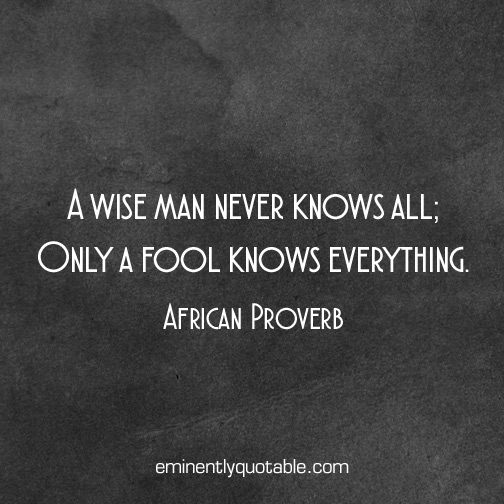
graphic © eminentlyquotable.com
A wise man never knows all; only a fool knows everything. – African Proverb
In 1999, David Dunning and Justin Kruger revealed that-in Dunning’s words-“…incompetent people do not recognize-scratch that, cannot recognize-just how incompetent they are.” Referred to as the Dunning-Kruger effect, this cognitive bias may weaken the self-confidence of competent people, as they may falsely underestimate themselves. On the other hand, it boosts the self-confidence of the unskilled!
Dunning and Kruger found that unskilled individuals suffer from illusory superiority. This explains why unskilled people have the nerve to call themselves “experts.” Blame it on their metacognitive inability to recognize their incompetence. According to Dunning and Kruger, incompetent people will also tend to overestimate their own level of skill, fail to recognize skill in others, and fail to recognize the extremity of their inadequacy. They recognize and acknowledge their own lack of skill, only after they are exposed to training for that skill.
In their experiments, they examined the self-assessment of Cornell graduates in psychology courses in their logical reasoning skills, grammatical skills, and humor. Surprisingly, the competent group estimated their rank accurately while the incompetent group overestimated theirs. They noted that “participants in the bottom quartile on tests of humor, grammar, and logic grossly overestimated their test performance and ability. Although test scores put them in the 12th percentile, they estimated themselves to be in the 62nd.”
As the line goes in “As You Like It”, one of Shakespeare’s play: “The fool doth think he is wise, but the wise man knows himself to be a fool.”
😳 What Tinnitus Does To Your Brain Cells (And How To Stop It)
After 47 years of studies and countless brain scans done on more than 2,400 tinnitus patients, scientists at the MIT Institute found that in a shocking 96% of cases, tinnitus was actually shrinking their brain cells.
As it turns out, tinnitus and brain health are strongly linked.
Even more interesting: The reason why top army officials are not deaf after decades of hearing machine guns, bombs going off and helicopter noises…
Is because they are using something called "the wire method", a simple protocol inspired by a classified surgery on deaf people from the 1950s...
★ How To Get Rid Of Nail Fungus:
★ Does Your Salad Contain This Vegetable?
★ Top 10 Most Valuable Medicinal Herbs:





